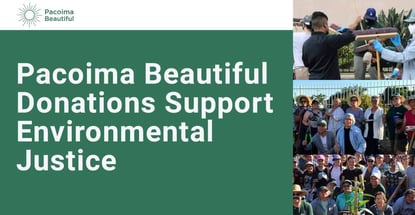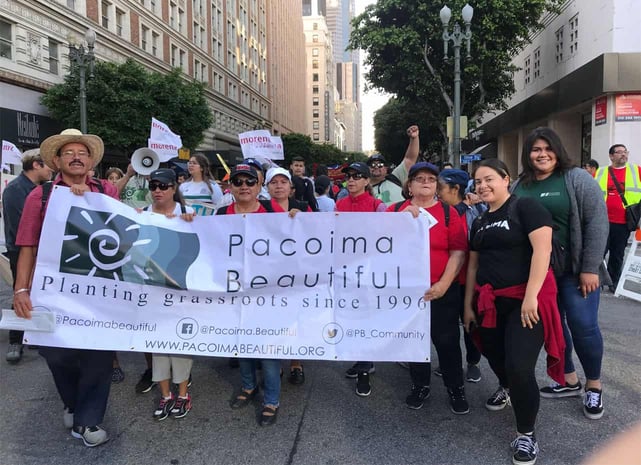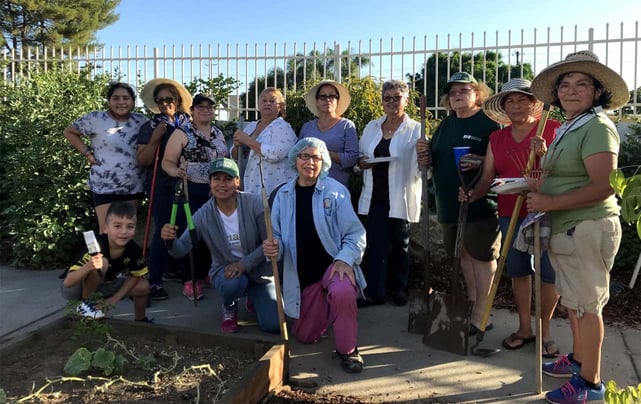
Our experts and industry insiders blog the latest news, studies and current events from inside the credit card industry. Our articles follow strict editorial guidelines.
In a Nutshell: Los Angeles neighborhood Pacoima has been subjected to pollution from nearby airports, freeways, and power plants for many decades. In response, local mothers started Pacoima Beautiful, a nonprofit with volunteer and advocacy wings, to seek environmental justice for residents. Recent initiatives have included a campaign to shut down a nearby airport and a long-term project to develop access to outdoor spaces in the neighborhood. The organization understands what Pacoima residents want because both volunteers and the leadership team are residents themselves.
Residents of Pacoima, one of the oldest neighborhoods in Los Angeles, have long faced health issues caused by toxic chemicals. The area is close to many chemical producers, including a power plant, freeways, and industrial facilities. What’s more, the neighborhood’s location in the San Fernando valley means that dangerous nitrogen dioxide and ozone sink to ground level.
UCLA public health professor Michael Jerrett says that the neighborhood’s proximity to polluters makes residents more likely to develop health issues, like asthma.
“There is scientific literature out there that would suggest that people living in more polluted areas are more likely to develop asthma. And they’re more likely to have severe and more frequent symptoms,” he noted.
In addition, nearby airports also cause problems for those who live in Pacoima and neighboring areas. Specifically, leaded gas, which was banned for cars in 1996, is still used by small planes and helicopters. The nearby Long Beach Airport emits 1,600 pounds of lead each year.

Pacoima residents — 83% of whom are Latino — were fed up with their neighborhood being susceptible to so many different pollutants. So in 1997, they formed Pacoima Beautiful, a nonprofit designed to clean up the neighborhood and develop meaningful policies that would make the area healthier.
“We learned about serious environmental impacts like landfills, the asphalt recycling center, the airport, the freeways and all the other industries. So, that created our commitment to environmental justice, social justice, and health. I’m from the neighborhood, so this is my ideal position. I get to serve the community I grew up in and address the issues that inspired me,” said Executive Director Veronica Padilla-Campos.
Identifying and Organizing Policy Improvements
Pacoima Beautiful’s policy department has developed local and state policies that positively impact local residents.
Currently, the policy department is working on a campaign to shut down the Whiteman Airport. According to the nonprofit’s website, the airport has brought the community environmental and safety issues, including 85 accidents since 1946 and emissions from lead-based fuel in planes.
The airport doesn’t even have an impact on the local economy, the nonprofit argues.
“The campaign has been really racially charged, so it hasn’t been easy. Making policy change takes a lot of organizing effort, not just with the community but with other partners writing up motions and drafts and talking to our elected officials,” said Veronica.

The policy team has also been working to establish the Pacoima Wash Greenway for over 15 years. Residents in the area have very little access to nature, even though the neighborhood is close to the hills of the San Fernando Valley. So, the team has been in the works to develop not only new parks but also roads, bridges, and other amenities to offer access for all community members.
“An enhanced Pacoima Wash will provide a trail network and new local parks along the Pacoima Wash, increase opportunities for active and passive recreation and create a community focal point that promotes healthy lifestyles and addresses public health and environmental issues,” explained the Vision Plan for the project.
Health-Focused Initiatives Better the Community
Pacoima Beautiful was founded by five mothers of color who were tired of seeing their children deal with negative health outcomes due to environmental factors. Today, mothers, fathers, and families are still the nonprofit’s most reliable volunteers.
“Oftentimes, they are the ones that are doing the thankless work. We want to uplift that work, and the folks who are on the ground, helping us to move the work forward. We want to put a name and face to the community,” said Veronica.
For instance, volunteers turned a former site that was used for illegal dumping into the “only sidewalk edible garden in the San Fernando Valley.” Community members tend to Jardin Pacoima together, strengthening their bond with one another, and having access to the fresh food they need.

Similarly, volunteers established the Mercado Pacoima, a program where families can exchange produce and spices that they produce with one another. The food swap also diminishes food insecurity and develops community ties.
Both these volunteer groups and the nonprofit’s leadership team are passionate about communicating issues to the community. They make sure to explain environmental problems and impacts in a way that gets through to locals. Certainly, a homegrown organization like Pacoima Beautiful brings these concerns home to them in ways that other environmental nonprofits would be unlikely to be able to.
“At the end of the day, if you don’t have your health, if you don’t have quality of life, you really can’t do anything else. So, it’s been really great to see families involved in what we do. We’re almost an extension of family,” said Communications Director Andres Rivera.
Pacoima Beautiful Relies on Grants and Donations
Pacoima Beautiful has been operating for 25 years, and over that time, they have developed meaningful relationships with many funders, including the Bank of America Foundation and the EPA.
“Our goal has always been to diversify our funding. So, I think we continue to be strong with government agencies providing grants for different outreach projects or studies,” said Veronica.
Recently, the nonprofit has been awarded funding from the Bezos Earth Fund, the Liberty Hill Foundation, and California Kidney Foundation.
Veronica and her team are also trying to build up their individual giving program. If credit cardholders want to donate their points to nonprofits, they can do so by cashing them out for statement credit or directly using their credit cards to support Pacoima Beautiful.
“We really welcome general operating funds because they let you pay for everything you need to make the office function. Government grants are really restrictive, like you can use it for childcare or for food but you can’t have a community meeting,” Andres told us.
Pacoima Beautiful has been functioning for over two decades because they listen to their community. Though the organization has improved the neighborhood’s environmental problems, the team still has many priorities they have yet to fulfill — and they’re always looking for new volunteers to help them.
“If you’re passionate about local initiatives that are impacting air quality or the environment, then Pacoima Beautiful has something for you to get involved in. We’re up to big things, and we think that taking on so much is how we’re going to be able to create the impact in the area that our community needs to see that change,” said Andres.
![3 Credit Cards For Kids & Ways to Help Them Build Credit ([updated_month_year]) 3 Credit Cards For Kids & Ways to Help Them Build Credit ([updated_month_year])](https://www.cardrates.com/images/uploads/2022/03/Credit-Cards-For-Kids.jpg?width=158&height=120&fit=crop)

![6 Credit Strategies to Help You Financially Prepare for the Holidays ([current_year]) 6 Credit Strategies to Help You Financially Prepare for the Holidays ([current_year])](https://www.cardrates.com/images/uploads/2019/10/Holiday-Credit-Strategies-Feat.jpg?width=158&height=120&fit=crop)

![12 Ways Credit Cards Help Save on Vacations ([updated_month_year]) 12 Ways Credit Cards Help Save on Vacations ([updated_month_year])](https://www.cardrates.com/images/uploads/2022/05/Ways-Credit-Cards-Help-You-Save-on-Summer-Vacations.jpg?width=158&height=120&fit=crop)

![Compare Credit Cards: 18 Best Offers Today ([updated_month_year]) Compare Credit Cards: 18 Best Offers Today ([updated_month_year])](https://www.cardrates.com/images/uploads/2017/06/comparison2.jpg?width=158&height=120&fit=crop)
![10 Credit Repair Credit Cards ([updated_month_year]) 10 Credit Repair Credit Cards ([updated_month_year])](https://www.cardrates.com/images/uploads/2021/11/Credit-Repair-Credit-Cards.jpg?width=158&height=120&fit=crop)